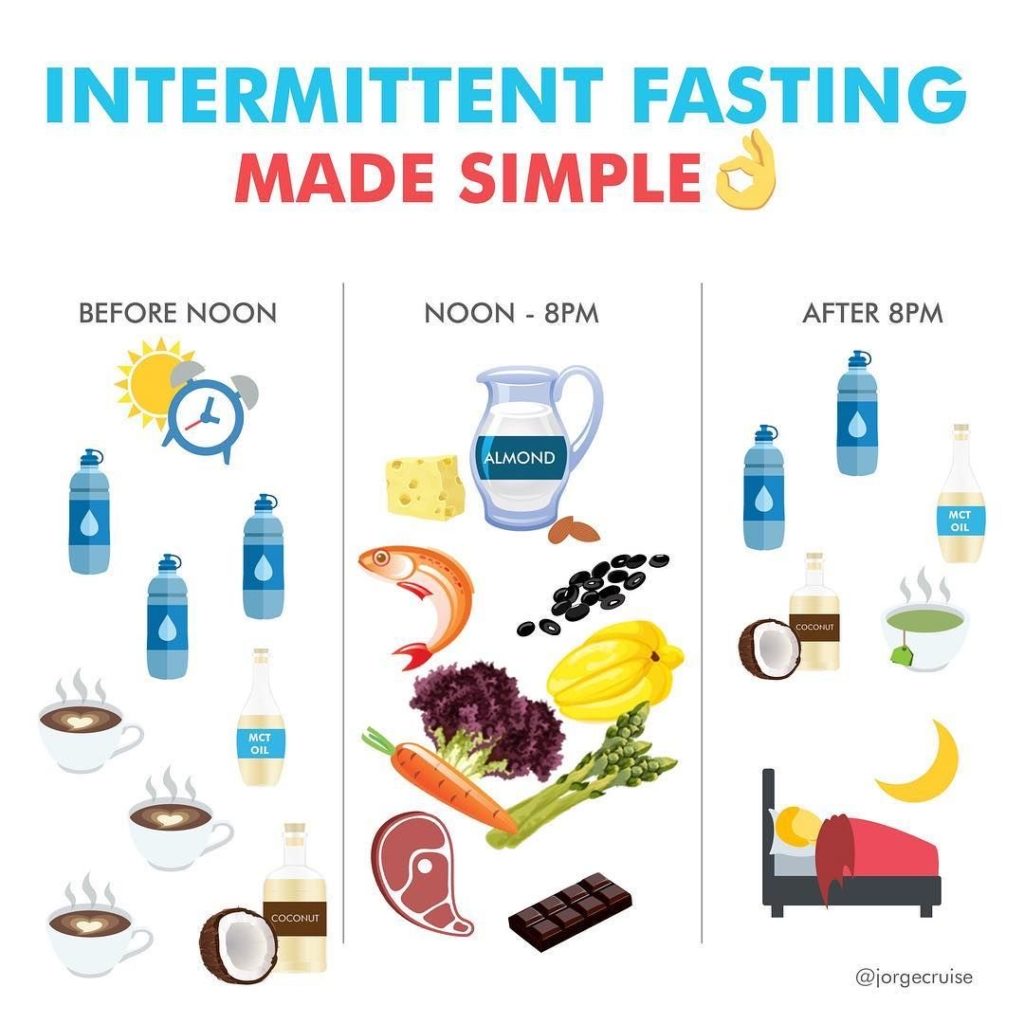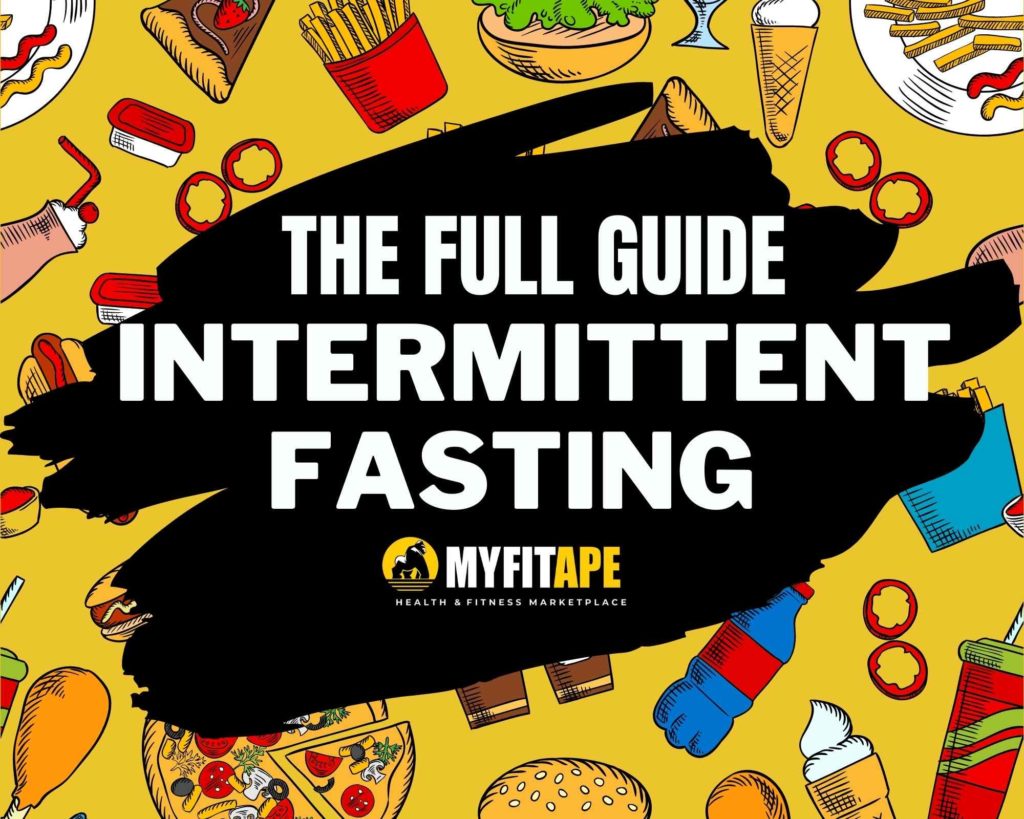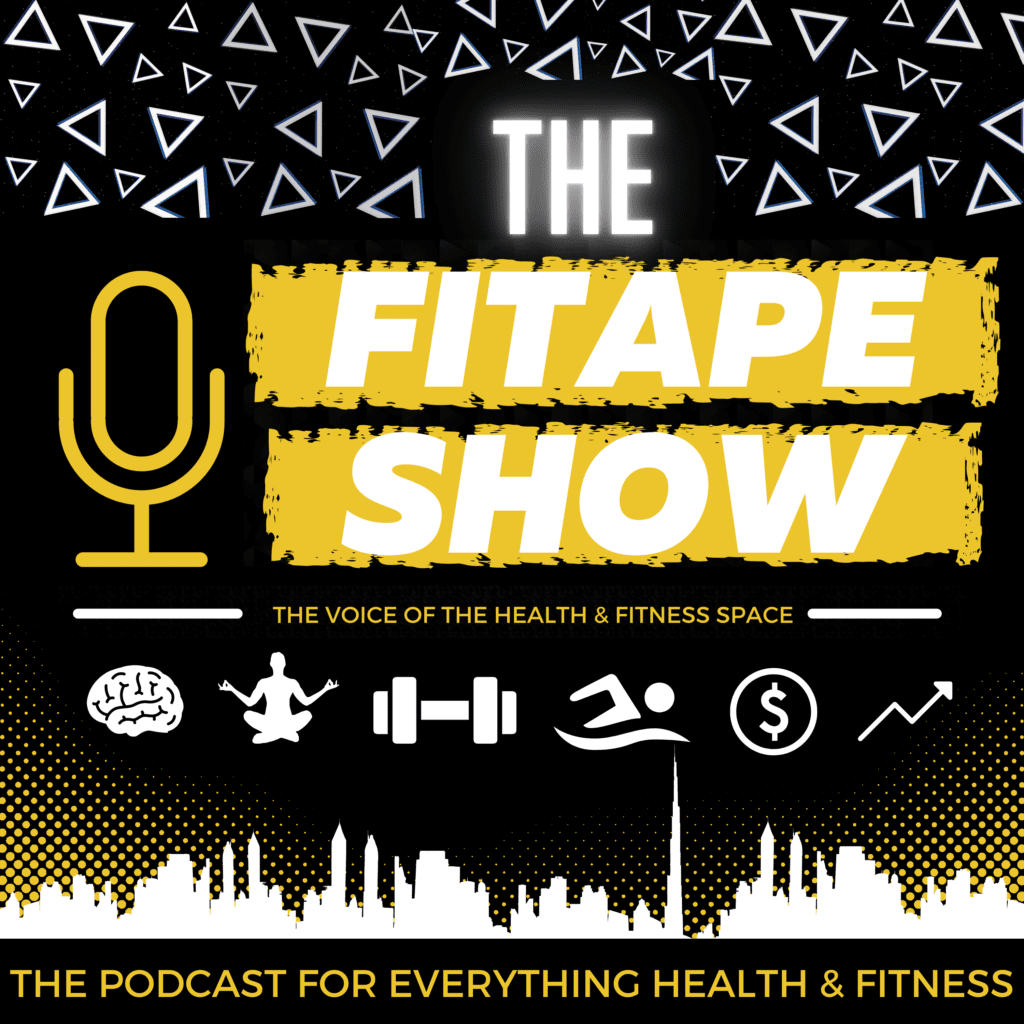What Is Intermittent Fasting (IF)?
Fasting is an old custom, having actually been exercised by numerous cultures and religious beliefs over centuries Therapeutic intermittent fasts for the therapy of weight problems were explored in 1915, with a renewed passion in the medical community in the 1960s after Flower and his colleagues released a “passionate record”.
Intermittent fasts, or “temporary malnourishment durations”, were ranging from 1 to 14 days in those very early studies. This excitement passed through magazines at the time, which triggered scientists and medical professionals to warn about the use of intermittent fasts without clinical monitoring. A contemporary kind of intermittent fasting, the 5:2 diet, began in the United Kingdom as well as also became preferred in Australia.
Intermittent fasting (IF) is an eating pattern that cycles in between periods of fasting as well as consuming. It doesn’t specify which foods you must eat however instead when you need to eat them. In this respect, it’s not a diet plan in the traditional setting, yet even more precisely an eating pattern. Common intermittent fasting approaches include every day 16-hour fasts or fasting for 24 hours, twice each week.
Fasting has been a practice throughout human evolution. Old hunter-gatherers really did not have grocery stores, refrigerators or food available year-round. Often they could not find anything to eat.
Therefore, humans developed to be able to function without food for prolonged time periods. As a matter of fact, fasting once in a while is more all-natural than constantly consuming 3-4 (or more) dishes per day.
Fasting is likewise typically done for spiritual or spiritual factors, consisting of in Islam, Christianity, Judaism as well as Buddhism.
Why Intermittent Fasting May Benefit You
Research study reveals that the intermittent fasting durations do more than just melt fat. Mattson clarifies, “When changes accompany this metabolic function, it affects the body and also mind.”
Among Mattson’s research studies published in the New England Journal of Medicine revealed data about a variety of health benefits related to the practice. These include a longer life, a leaner body and a sharper mind.
Many stages happen throughout intermittent fasting that can preserve organs against developing chronic illness like type 2 diabetes, heart disease, age-related neurodegenerative conditions,inflammatory digestive tract illnesses and numerous cancers.
The study exposed just some of the intermittent fasting benefits:
- Thinking and memory. Studies found that intermittent fasting boosts functioning memory in animals as well as spoken memory in adult humans.
- Heart wellness. Intermittent fasting improved blood pressure as well as relaxing heart muscles as well as other heart-related measurements.
- Physical efficiency. Fasting in a 16 window showed weight loss while preserving muscular tissue mass. Mice who were fed on alternate days showed much better results in their running endurance.
- Diabetes and weight problems. In animal studies, intermittent fasting sharply avoided the risk of obesity. In 6 key research studies, obese adults slimmed down through intermittent fasting.
- Tissue health. In animals, intermittent fasting lowered tissue damages in surgical treatment and also enhanced general results.
How Intermittent Fasting Helps Weight Loss
Weight loss is one of the most common factors for individuals to give intermittent fasting a go.
By making you eat less, intermittent fasting can cause an automated decrease in calorie intake. Furthermore, intermittent fasting changes hormone levels to facilitate weight loss. Along with lowering insulin and also raising your working hormones, it raises the release of the fat loss hormonal agent norepinephrine (noradrenaline).
Due to these adjustments in hormonal agents, short-term fasting may likely boost your metabolic rate by 3.6% to as high as 14%.
By eating fewer and burning more calories, intermittent fasting causes weight management by transforming both sides of the caloric equation.
Research studies show that intermittent fasting can be a very powerful weight loss device. A 2014 review research study showed eating patterns can trigger 3-8% weight-loss over 3-24 weeks, which is a considerable quantity, compared to the majority of weight-loss research studies out there.
According to the very same study, individuals additionally lost 4-7% of their waistline fat, showing a considerable loss of unsafe tummy fat that builds up around your body organs and triggers further condition. One more research showed that intermittent fasting causes much less muscular tissue loss than the more common method of constant calorie counting.
Nonetheless, bear in mind that the main reason for its success is that intermittent fasting aids in consuming far fewer calories overall. If you binge and consume massive amounts during your consuming periods, you might not lose any weight at all.
When Should You Intermittently Fast?

The 16/8 Method
The 16/8 method entails fasting everyday for 14-16 hrs as well as restricting your day-to-day consuming home window to 8-10 hours. Within the eating home window, you can fit in 2, 3, or more dishes.
This approach is likewise called the Leangains protocol and was promoted by fitness professional Martin Berkhan. Doing this technique of fasting can in fact be as straightforward as not eating anything after dinner time and also avoiding breakfast.
For example, if you finish your last dish at 8pm and stop eating until midday the next day, you’re technically fasting for 16 hours. It’s normally suggested that women should only fast for 14-15 hours because they seem to do far better with smaller fasts. For people who tend to be hungrier in the mornings who prefer to eat breakfast, this technique might be tough to get used to in the beginning.
Nonetheless, several breakfast champions instinctively consume in this manner.
You can drink water, coffee, and various zero-calorie beverages throughout the fast, which can help reduce sensations of hunger.
It’s really crucial to mainly consume healthy and balanced foods during your eating window. This approach won’t function if you eat huge amounts of fast food or high calorie foods.
The 24 Hour Fast
In this manner of doing IF, you would be fasting from dinner to dinner (or lunch to lunch). If you consume dinner on day 1, you would certainly avoid the next day’s breakfast as well as lunch and consume dinner once more on day 2. This is likewise referred to as “one meal a day,” or OMAD. It is usually done a couple of times each week.
The ‘Eat Stop Eat’ Fast
Brad Pilon developed ‘Eat Stop Eat’, which is a fasting technique that includes consuming absolutely nothing for 24 hours, twice a week. It does not matter what days a person doesn’t eat, or even when they choose to start. The only constraint is that the fasting must last for 24 hours as well as on non-consecutive days. Individuals who do not consume for 24 hours will likely become very hungry. Choosing ‘Eat Stop Eat’ might not be the best approach for people who are not familiar with fasting to begin with.
The 36 Hour Fast
This involves fasting for the entire day. As an example, if you eat dinner on day 1, you would fast for every one of day 2 as well as not consume once more until breakfast on day 3. This is usually 36 hours of fasting. This might supply an extra powerful weight-loss advantage and may aid in preventing hunger pangs.
The 5:2 Diet
5:2 diet regimen includes consuming generally 5 days of the week while limiting your calorie consumption to 500-600 for 2 days of the week.
This diet plan is also called the ‘Fast Diet’ as well as was popularized by British journalist Michael Mosley. On the fasting days, it’s advised that women consume 500 calories and for men, it’s 600. For example, you might eat normally on a daily basis of the week except Mondays and Thursdays. For those 2 days, you consume 2 small portions of 250 calories each for females. For men, it’s 300 calories.
As critics like to point out, there are no studies evaluating the 5:2 diet itself, yet there are plenty of studies on the benefits of the standard intermittent fasting plan.
The Alternate Day Fast
In alternate-day fasting, you fast every other day. There are several different versions of this approach. Several of them permit tracking your 500 calories limit, throughout the fasting days. A number of the key studies conducted, revealed health and wellness advantages of intermittent fasting. An entire days fast can seem initially intimidating, so it’s not suggested for absolute beginners. With this technique, you might go to sleep truly hungry numerous times each week, which is not extremely pleasant and also most likely unsustainable in the long term.
The Warrior Fast
The Warrior Diet was popularized by health and fitness expert Ori Hofmekler. It means eating small amounts of raw fruits and vegetables throughout the day as well as eating one huge dish at night. Essentially, you routinely snack all day then feast in the evening within a four-hour eating home window. The Warrior Diet was one of the first prominent diets to include a form of intermittent fasting. This diet’s food selections are rather similar to that of the paleo diet, which includes mainly unprocessed foods. The Warrior Diet maintains surviving on just small amounts of vegetables as well as fruits during the day, after that eating 1 big dish in the evenings.
The Extended Fast
The first and important consolidation of extensive fasts is to always consult your health care professional to ensure you are not at risk of causing yourself any undue harm. Usually, for fasts higher than 2 days, we recommend a multivitamin to avoid micronutrient deficiency.
The world record for fasting is 382 days (although we do not suggest this). For most people, going 7-14 days may be more feasible.
We discourage individuals from fasting for more than 2 week due to a high threat of ‘refeeding disorder’, where harmful fluid imbalances can occur. This could throw off your bodies systems and disrupt the key mineral mechanisms. This has been known to happen when food is reintroduced after a long period of time.
Where Do I Fit My Workouts Into My Intermittent Fasting?
Fasted workouts are an incredible addition to your workouts. Some individuals advise taking branched-chain amino acids (BCAAs) before a fasted workout.
Considerations
Safety
Some people try intermittent fasting to track their weight, as well as using the fasting techniques to resolve chronic conditions such as digestive tract syndrome, high cholesterol or arthritis.
Having said this, intermittent fasting isn’t for every person. Williams emphasizes that before you try intermittent fasting (or any diet), you must check in with your primary care professional.
Some individuals should avoid trying intermittent fasting:
- Kids and teenagers under the age of 18
- Women who are pregnant or breastfeeding
- People with diabetes or high blood sugar levels
- Those with a history of eating disorders
However, Williams states, people not in these classifications who can do intermittent fasting. “It can be a way of living,” she claims.
Keep in mind that intermittent fasting may have different impacts on various individuals. Speak with your doctor if you start experiencing unusual anxiousness, migraines, nausea or vomiting or other symptoms after you start intermittent fasting.
Night-time eating is linked to impaired rest quality.
For example, studies in the United Kingdom and United States showed intermittent fasting to have no links to improving the symptoms of a cancer patient.
Although a few small-scale scientific studies suggest that it might minimize the effects of chemotherapy.
Periodic fasting might have a small impact on chronic pain conditions and may show signs of lowering toxic elements for such disorders. For example, intermittent fasting has not been shown to improve symptons of some bone related ailments.
It’s also been shown overnight fasting before workouts, actually increases lipolysis, but reduces efficiency in long term exercise (greater than 60 minutes).
This sort of nutritional pattern would certainly be challenging for someone who eats every couple of hours (e.g. snacks between dishes). It would certainly not be suitable for those who eat regularly due to metabolic modifications brought on by their medications, such as with type 2 diabetes. Prolonged durations of food starvation or semi-starvation puts one at risk for overeating when food is reestablished, as well as it might promote harmful habits such as a heightened fixation for food.
People with the following conditions should abstain from intermittent fasting:
- Eating disorders such as unhealthy self-restriction (anorexia nervosa or bulimia nervosa).
- Drug users that require food consumption.
- Active growth stage, such as in teenagers.
- Pregnancy or breastfeeding.
Who It’s For
Intermittent fasting is absolutely not for everybody. If you’re underweight or have a background of eating conditions, you should try speaking with your local wellness professional first and foremost.
In these cases, it can be downright unsafe.
Some study shows that this type of diet plan might suppress signs and symptoms of asthma. If you have medical conditions, talk with your doctor prior to you trying out intermittent fasting.
Who It’s Not For
You may decide IF is not for you, if you are:
- Undernourished (BMI < 18.5) or have an eating problem like anorexia nervosa
- Pregnant – you need extra nutrients for your child
- Breastfeeding – you need extra nutrients for your kid
- A child under 18 – you need extra nutrients to grow. You can probably quickly, but may need clinical guidance, under these problems
- If you are taking prescription medicine
- If you have gout, arthritis or high uric acid
- If you have any kind of significant medical problems, such as liver disease, kidney disease or heart problems
Consuming Whilst Fasting
Water, coffee, tea or any other non-caloric drinks are fine. Try not adding sugar to your coffee as this can affect your insulin levels. Try a dash of milk or cream might be okay.
Coffee can be especially advantageous throughout a fast, as it can stave off hunger for several hours at a time.
Is It Good To Miss Breakfast
Generally it’s not a good idea to miss breakfast. The problem is that most stereotypical breakfast skippers have unhealthy ways of living.
If you make sure to eat healthy foods for the remainder of the day then the technique is extremely beneficial.
Lastly
Intermittent fasting is a weight loss tool that works for many individuals, though it doesn’t help every single person.
Some individuals believe it might not be as valuable for women as it’s shown to be for men. It’s additionally not recommended for people who are vulnerable to unusual eating conditions.
If you make a decision to attempt intermittent fasting, remember that a healthy diet plan is the foundation to any healthy lifestyle.
It’s not possible to binge on fast food throughout the eating periods and also anticipate to reduce weight and also enhance your health.





